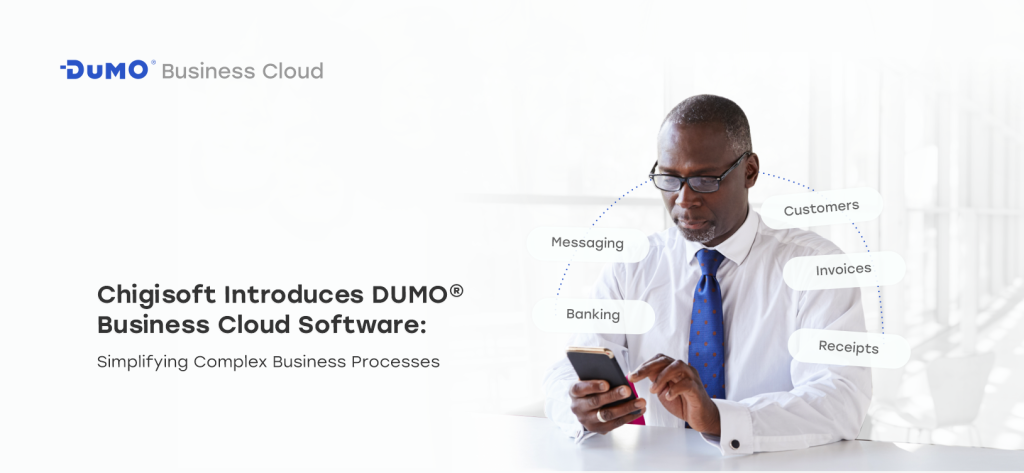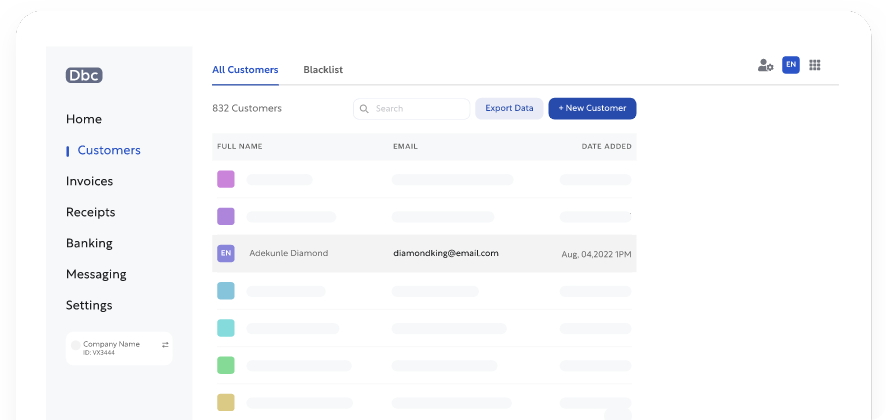In today’s fast-paced and competitive business landscape organizations are increasingly resorting to business management software to remain ahead of the competition and successfully streamline operations because effective management is crucial for the success of any organization. These powerful software tools enable firms to optimize operations, improve communication, and make data-driven choices. As we approach the end of the second quarter in 2023, it is critical to investigate the best business management software available to enable your organization’s success.
Business Management software such as DUMO Business Cloud is designed to streamline and automate various processes, providing organizations with the tools they need to optimize operations, enhance productivity, and achieve their goals. It empowers businesses to make informed decisions, collaborate effectively, and adapt to changing market dynamics. These software solutions, which range from project management and customer relationship management to financial tracking and human resources, enable firms to optimize their operations, increase efficiency, and fulfill their objectives. By implementing robust Business management software, organizations can improve efficiency, reduce costs, enhance customer satisfaction, and gain a competitive edge. It provides a centralized platform for data management, enables real-time insights, and facilitates seamless communication and collaboration among team members.
The best business management software in 2023 combines cutting-edge features, user-friendly interfaces, and robust integration capabilities to empower organizations of all sizes to thrive in today’s digital era. By the end of this guide, you will have a comprehensive understanding of the best business management software options in 2023, enabling you to choose the most suitable solution to drive your organization’s success. Whether you’re seeking a comprehensive suite or individual tools to address specific challenges, this guide will equip you with the knowledge necessary to make an informed decision and unlock the full potential of your business. So, let’s go into the world of the top business management software in 2023 and uncover the transforming potential they offer for your corporation.
Understanding Business Management Software
Business management software refers to a set of integrated applications or systems designed to assist organizations in managing and automating various aspects of their operations. It provides a centralized platform to streamline processes, optimize efficiency, and improve overall performance across different departments and functions within an organization. Business management software serves as a comprehensive toolset that enables businesses to effectively plan, execute, and monitor their activities, making it an essential asset for achieving operational excellence and driving success.
The scope of business management software is vast and encompasses a wide range of functionalities and features. It addresses diverse areas of business operations, such as project management, customer relationship management (CRM), human resources management (HRM), financial management, inventory and supply chain management, and more. By offering a holistic approach to managing different aspects of the business, management software helps organizations achieve better coordination, collaboration, and decision-making, leading to improved productivity and profitability.

Benefits of Business Management Software
A. Streamlining and Automating Business Processes
One of the key benefits of business management software is its ability to streamline and automate various business processes. By digitizing and centralizing essential tasks, organizations can eliminate manual and time-consuming processes, reducing errors and improving efficiency. Business management software enables the automation of repetitive tasks, such as data entry, document generation, and workflow approvals. This streamlining of processes leads to increased productivity, reduced operational costs, and faster turnaround times.
B. Improving Productivity and Operational Efficiency
Business management software plays a vital role in improving productivity and operational efficiency within organizations. With features like task management, resource allocation, and real-time collaboration tools, employees can work more efficiently and effectively. The software provides visibility into project timelines, task dependencies, and resource availability, allowing teams to optimize their workflows and meet deadlines. Additionally, automation features minimize manual errors, save time, and enable employees to focus on more value-added activities.
C. Enhancing Decision-Making and Strategic Planning
Effective decision-making is crucial for business success, and business management software empowers organizations with the necessary tools and insights to make informed decisions. With features such as data analytics, customizable dashboards, and real-time reporting, businesses can gain valuable insights into key performance indicators (KPIs) and trends. This data-driven approach enables organizations to identify areas of improvement, make strategic decisions, and adapt to market changes proactively.
D. Facilitating Collaboration and Communication
Collaboration and communication are essential for efficient teamwork and successful project execution. Business management software provides a centralized platform where team members can collaborate, share information, and communicate in real-time. Features like document sharing, task commenting, and instant messaging foster better teamwork and ensure everyone is on the same page. By facilitating collaboration, the software breaks down silos, improves transparency, and enhances overall team productivity.
E. Enhancing Customer Relationship Management
Business management software, particularly customer relationship management (CRM) software, offers valuable tools for managing and enhancing customer relationships. It provides a centralized database to store customer information, track interactions, and manage sales opportunities. CRM software enables businesses to provide personalized experiences, improve customer satisfaction, and drive sales growth. By leveraging customer data and analytics, organizations can identify trends, preferences, and opportunities for upselling or cross-selling.
F. Ensuring Data Security and Compliance
In today’s digital landscape, data security and compliance are paramount concerns for businesses. Business management software incorporates robust security measures to protect sensitive data from unauthorized access or breaches. It ensures secure data storage, encryption, access controls, and regular backups. Moreover, reputable software providers stay up to date with data privacy regulations and compliance requirements, helping organizations maintain regulatory compliance and protect customer and business data.
G. Supporting Scalability and Business Growth
As businesses grow and evolve, scalability becomes a critical factor. Business management software offers the flexibility and scalability to adapt to changing business needs. It can accommodate an increasing volume of data, users, and processes without significant disruptions. The software allows businesses to easily scale resources, add new features or modules, and integrate with other systems as needed. This scalability supports business growth by providing the necessary infrastructure and tools to expand operations efficiently.
Business management software offers a multitude of benefits that empower organizations to streamline processes, improve productivity, make informed decisions, enhance collaboration, manage customer relationships, ensure data security, and support scalability. By harnessing the capabilities of such software, businesses can optimize their operations, drive success, and stay competitive in today’s dynamic business landscape.
Factors to Consider in Choosing Business Management Software
A. Assessing Organizational Needs and Requirements
Before selecting a business management software, it is crucial to assess the specific needs and requirements of your organization. This involves understanding your business processes, identifying the areas that need improvement or automation, and defining your goals and objectives. Consider factors such as the size of your organization, industry-specific requirements, and the complexity of your operations. By conducting a thorough analysis, you can align your software selection with your organization’s unique needs.
B. Identifying Specific Pain Points and Challenges
To choose the right business management software, it is essential to identify the specific pain points and challenges faced by your organization. These could include inefficient processes, lack of collaboration, data inconsistencies, or difficulties in decision-making. By understanding these challenges, you can prioritize features and functionalities that directly address them. Focus on selecting a software solution that can effectively resolve your organization’s pain points and provide tangible benefits.
C. Scalability and Flexibility for Future Growth
Considering the future growth of your organization is vital when choosing business management software. You need a solution that can scale alongside your business and accommodate increased data volumes, users, and processes. Look for software that offers flexibility and customization options to adapt to evolving business requirements. This scalability ensures that your software investment can support your organization’s growth and expansion in the long run.
D. Integration Capabilities with Existing Systems
Business management software should seamlessly integrate with your existing systems to avoid data silos and maximize operational efficiency. Evaluate the integration capabilities of the software with other tools, such as CRM, accounting software, or project management systems, that your organization already uses. This integration enables smooth data flow, eliminates duplicate data entry, and provides a holistic view of your business operations. Prioritize software solutions that offer robust integration options or provide APIs for easy integration.
E. User-Friendliness and Ease of Implementation
User-friendliness and ease of implementation are crucial factors to consider in selecting business management software. The software should have an intuitive interface that is easy to navigate and understand for your employees. Look for solutions that offer comprehensive onboarding, training, and support resources to ensure a smooth transition. Consider the implementation timeline and any potential disruptions to your operations during the deployment process. Choosing user-friendly software reduces the learning curve for your team and facilitates faster adoption.
F. Security and Data Protection Measures
Data security is of utmost importance when selecting business management software. Evaluate the security measures implemented by the software provider to protect your sensitive business data. Look for features such as data encryption, access controls, user authentication, and regular backups. Additionally, consider compliance with data privacy regulations, such as GDPR or HIPAA, depending on your industry. Conduct due diligence on the software vendor’s security practices and certifications to ensure your data is safeguarded.
G. Vendor Reputation, Support, and Reliability
When choosing business management software, it is essential to consider the reputation, support, and reliability of the software vendor. Research the vendor’s track record, customer reviews, and testimonials to gauge their credibility and customer satisfaction levels. Assess the vendor’s responsiveness and availability of customer support channels, such as phone, email, or live chat. Look for a vendor that provides regular updates and enhancements to the software and has a strong commitment to customer success. A reliable vendor ensures ongoing support and a long-term partnership for the success of your business.
Top Business Management Software Solutions in 2023
In this section, we will provide an overview of the top business management software providers in 2023. These software solutions have established themselves as leaders in the industry and offer comprehensive features and functionalities to meet the diverse needs of businesses. We will highlight their strengths, target industries, and key benefits to help you make an informed decision.
1. DUMO Business Cloud
DUMO Business cloud is a Business management software that simplifies complex business processes such as banking, Invoices, customers, messaging, online payment, and receipts. This is the ultimate solution for simplifying and streamlining complex business processes. Say goodbye to the difficulty in managing banking, invoices, customer interactions, online payments, and receipts separately. DUMO Business Cloud brings all these essential elements together in one powerful software, making your business management seamless and efficient.
Imagine effortlessly generating professional invoices, accepting online payments, and managing your bank accounts from a single platform. With DUMO Business Cloud, you can do just that. Streamline your financial operations and gain valuable insights into your cash flow with real-time updates. Plus, enhance your customer relationships through seamless messaging and communication, ensuring no opportunity is missed. Don’t let complexity hold your business back – empower yourself with DUMO Business Cloud and witness the transformation in your day-to-day operations.

Features and Functionalities of DUMO Business Cloud Solution
1. Manage Money
With DUMO Business Cloud you can Connect your payment channels, and manage them from one place such as Send invoices, receipts accept and track payments.
- Invoicing and Receipts
- Online Payments
- Manage Bank Accounts
2. Interact with People
Interact better with the people that matter in your business — your team, customers, suppliers, affiliates using DUMO Business Cloud.
- Send Marketing Email
- Transactional and marketing SMS
3. Manage Products
The use of DUMO Business Cloud automates the way you sell your products and render your services, from RFQs to Quotes, POs, and Invoices.
- Inventory Management
- Order Management
- Service Flow Automation
4. Inventory Management
- Order Management
- Service Flow Automation
- Team and Client dashboard
Selecting the Right Business Management Software for Your Organization
A. Defining Selection Criteria and Priorities
To choose the right business management software for your organization, it is crucial to define your selection criteria and priorities. This involves identifying the specific needs and requirements of your organization, considering factors such as industry, size, and business processes. You should determine which features and functionalities are essential and prioritize them based on their impact on your organization’s success.
B. Evaluating Software Demos and Trials
One effective way to assess the suitability of business management software is through software demos and trials. Request demos from shortlisted vendors and evaluate how well their software aligns with your selection criteria. Engage in hands-on trials to experience the software’s user interface, functionality, and performance. This will allow you to gauge its usability, ease of navigation, and overall user experience.
C. Conducting Vendor Interviews and Seeking References
When considering business management software, it is important to conduct interviews with the vendors. This provides an opportunity to ask specific questions about the software’s capabilities, implementation process, customer support, and future updates. Additionally, seek references from existing customers who have implemented the software. Contact these references to gain insights into their experiences with the software and the vendor’s responsiveness and reliability.
D. Considering Budget and Cost-Effectiveness
Budget considerations play a significant role in selecting business management software. Assess the total cost of ownership, including licensing fees, implementation costs, training expenses, and ongoing support and maintenance. Compare the costs with the anticipated benefits and return on investment. Consider the scalability of the software and evaluate if it can grow with your organization while remaining cost-effective in the long run.
E. Making an Informed Decision and Obtaining Buy-In from Stakeholders
Based on your evaluation, make an informed decision on the business management software that best aligns with your organization’s needs and priorities. Ensure that key stakeholders are involved in the decision-making process to gain buy-in and support. Communicate the benefits of the selected software and how it will address pain points, improve efficiency, and drive organizational success. Address any concerns or objections raised by stakeholders and provide them with the necessary information to make an informed decision.
Implementing and Integrating Business Management Software
A. Planning the Implementation Process
Effective implementation planning is crucial for a successful adoption of business management software. Develop a comprehensive implementation plan that includes key milestones, timelines, resource allocation, and responsibilities. Define the scope of the implementation, identify potential risks, and establish contingency plans. Involve relevant stakeholders and ensure clear communication throughout the implementation process.
B. Data Migration and System Integration Considerations
If you are transitioning from existing systems to the new business management software, data migration and system integration are critical considerations. Determine the data that needs to be migrated and develop a plan to ensure its accuracy and integrity. Evaluate the software’s integration capabilities with other existing systems, such as accounting software, CRM systems, or third-party applications. Seamless integration will enable smooth data flow and process synchronization across different systems.
C. Training and Onboarding Strategies
To maximize the benefits of the business management software, invest in comprehensive training and onboarding strategies. Develop training materials and conduct training sessions to educate employees on how to effectively use the software. Consider providing ongoing support and resources to address any questions or challenges that arise during the onboarding process. Encourage employees to embrace the software and emphasize the positive impact it will have on their work.
D. Change Management and User Adoption
Implementing new software often involves change, and managing this change is essential for successful user adoption. Develop a change management plan that includes communication strategies, addressing resistance to change, and promoting a positive mindset towards the new software. Encourage user feedback and engagement throughout the implementation process. Monitor user adoption and provide ongoing support to ensure that employees are effectively using the software and experiencing its benefits.
Maximizing the Benefits of Business Management Software
A. Best Practices for Optimizing Software Utilization
To maximize the benefits of business management software, it is essential to implement best practices for its utilization. This involves training employees on the software’s functionalities and ensuring they understand how to use it effectively. Encourage users to adopt standardized processes and workflows provided by the software to streamline operations. Regularly monitor and assess software usage to identify any areas of improvement and provide additional training or support as needed.
B. Leveraging Advanced Features and Integrations
Business management software often comes with advanced features and integration capabilities that can further enhance its functionality and impact on your organization. Take the time to explore and understand these features, as they can provide additional value and automation to your business processes. For example, if your software has CRM integration, leverage it to improve customer relationship management and enhance sales and marketing efforts. Identify specific needs within your organization and explore how the software’s advanced features and integrations can address them.
C. Continuous Improvement and Software Updates
Business management software is continually evolving, with new updates and enhancements being released by the software providers. It is important to stay up to date with these updates and take advantage of new features and improvements. Regularly review software release notes and communicate updates to relevant stakeholders in your organization. Implement a process for assessing the impact of updates and ensuring a smooth transition to new versions of the software. By staying current with software updates, you can leverage the latest capabilities and ensure that your organization remains competitive and efficient.
D. Monitoring and Measuring Success Metrics
To gauge the effectiveness of your business management software and its impact on your organization’s success, it is crucial to establish and monitor key success metrics. Define measurable goals and indicators that align with your organization’s objectives. This could include metrics such as improved productivity, increased customer satisfaction, reduced processing time, or enhanced profitability. Regularly track and analyze these metrics to evaluate the software’s performance and identify areas for improvement. Use the data gathered to make informed decisions, drive continuous improvement, and optimize the utilization of the software.
Learn more: Business Management Software for SMEs in Nigeria
Conclusion
Business management software has numerous advantages such as streamlining processes, improving productivity, enhancing decision-making, facilitating collaboration, ensuring data security, and supporting scalability. It is crucial to recognize the potential of business management software to transform your organization and drive success in today’s competitive business landscape.
In this guide, we have explored the importance of business management software, emphasizing on DUMO Business Cloud and its role in driving organizational success. We have discussed various aspects, including understanding the software, its benefits, factors to consider when choosing a solution, top software providers, selecting the right software, implementing and integrating it, and maximizing its benefits. leveraging the right business management software can empower your organization to achieve greater efficiency, productivity, and success. By carefully considering your organization’s needs, selecting the appropriate software solution, effectively implementing and integrating it, and continually optimizing its utilization, you can harness the full potential of business management software to propel your organization forward.
Remember, the journey does not end with the implementation; it is an ongoing process of continuous improvement, staying updated with software advancements, and measuring success through meaningful metrics. Embrace the power of business management software and embark on a path to optimize your operations, enhance decision-making, and drive your organization’s success in the dynamic business landscape.


